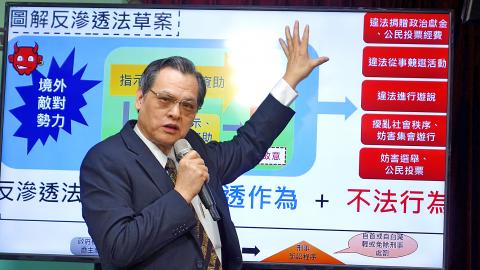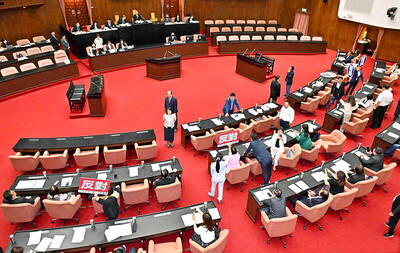The Anti-infiltration Act (反滲透法) is to take effect today, the Presidential Office said yesterday on its Web site.
The 12-article law, passed by the Legislative Yuan on Dec. 31, prohibits people acting on the instructions of or with the funding of “infiltration sources” from illegal campaigning or lobbying, or receiving illegal political donations, as well as disrupting social order, peaceful assemblies, elections or referendums.
While the activities are already defined as illegal in the Criminal Code, the Assembly and Parade Act (集會遊行法), the Presidential and Vice Presidential Election and Recall Act (總統副總統選舉罷免法) and the Civil Servants Election and Recall Act (公職人員選舉罷免法), the Anti-infiltration Act stipulates the punishments are applicable to people who break those laws on the instructions or with the financial support of infiltration sources, the Mainland Affairs Council (MAC) said.

Photo: Wang Yi-sung, Taipei Times
The Anti-infiltration Act applies only to people “who intentionally break the law, and not to those who are unaware of the situation,” the council added.
It stipulates that people who are influenced by infiltration sources and conduct illegal lobbying would be fined between NT$500,000 and NT$5 million (US$16,699 and US$166,990).
If the lobbying concerns national security issues, such as national defense, diplomacy and cross-strait affairs, the punishment would be a maximum of three years in prison or a fine of up to NT$5 million.
The Anti-infiltration Act states that for people who are influenced by infiltration sources and contravene articles 149 to 153 of the Criminal Code by disrupting social order, or Article 31 of the Assembly and Parade Act by disrupting peaceful assemblies and parades, the sentence would be increased by half of what is stipulated in the Criminal Code and the Assembly and Parade Act.
People who are influenced by infiltration sources to participate in illegal campaign activities, thus contravening the Presidential and Vice Presidential Election and Recall Act or the Civil Servants Election and Recall Act, would be sentenced to a maximum of five years in prison, or fined up to NT$10 million.
The Anti-infiltration Act states that people under the influence of infiltration sources who disrupt elections, recalls or referendums and contravene either of the two election and recall acts, would face a sentence increased by half of what is stipulated in the two acts.
A life sentence or a minimum of 15 years in prison would be given to those under the influence of infiltration sources who disrupt public gatherings such as an election or petition rally.
The Anti-infiltration Act aims to fend off infiltration, rather than curb all cross-border exchanges, the council said, adding that it would not restrict regular exchanges across the Taiwan Strait.

NO-LIMITS PARTNERSHIP: ‘The bottom line’ is that if the US were to have a conflict with China or Russia it would likely open up a second front with the other, a US senator said Beijing and Moscow could cooperate in a conflict over Taiwan, the top US intelligence chief told the US Senate this week. “We see China and Russia, for the first time, exercising together in relation to Taiwan and recognizing that this is a place where China definitely wants Russia to be working with them, and we see no reason why they wouldn’t,” US Director of National Intelligence Avril Haines told a US Senate Committee on Armed Services hearing on Thursday. US Senator Mike Rounds asked Haines about such a potential scenario. He also asked US Defense Intelligence Agency Director Lieutenant General Jeffrey Kruse

INSPIRING: Taiwan has been a model in the Asia-Pacific region with its democratic transition, free and fair elections and open society, the vice president-elect said Taiwan can play a leadership role in the Asia-Pacific region, vice president-elect Hsiao Bi-khim (蕭美琴) told a forum in Taipei yesterday, highlighting the nation’s resilience in the face of geopolitical challenges. “Not only can Taiwan help, but Taiwan can lead ... not only can Taiwan play a leadership role, but Taiwan’s leadership is important to the world,” Hsiao told the annual forum hosted by the Center for Asia-Pacific Resilience and Innovation think tank. Hsiao thanked Taiwan’s international friends for their long-term support, citing the example of US President Joe Biden last month signing into law a bill to provide aid to Taiwan,

China’s intrusive and territorial claims in the Indo-Pacific region are “illegal, coercive, aggressive and deceptive,” new US Indo-Pacific Commander Admiral Samuel Paparo said on Friday, adding that he would continue working with allies and partners to keep the area free and open. Paparo made the remarks at a change-of-command ceremony at Joint Base Pearl Harbor-Hickam in Hawaii, where he took over the command from Admiral John Aquilino. “Our world faces a complex problem set in the troubling actions of the People’s Republic of China [PRC] and its rapid buildup of forces. We must be ready to answer the PRC’s increasingly intrusive and

STATE OF THE NATION: The legislature should invite the president to deliver an address every year, the TPP said, adding that Lai should also have to answer legislators’ questions The Chinese Nationalist Party (KMT) yesterday proposed inviting president-elect William Lai (賴清德) to make a historic first state of the nation address at the legislature following his inauguration on May 20. Lai is expected to face many domestic and international challenges, and should clarify his intended policies with the public’s representatives, KMT caucus secretary-general Hung Meng-kai (洪孟楷) said when making the proposal at a meeting of the legislature’s Procedure Committee. The committee voted to add the item to the agenda for Friday, along with another similar proposal put forward by the Taiwan People’s Party (TPP). The invitation is in line with Article 15-2